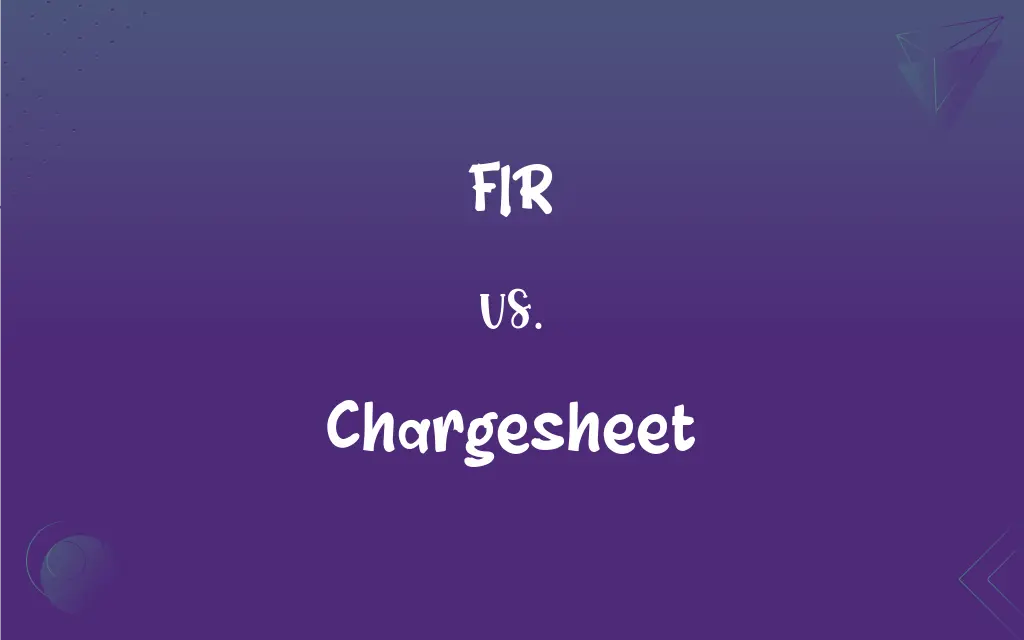FIR vs. Chargesheet: What's the Difference?
Edited by Janet White || By Harlon Moss || Published on November 27, 2023
An FIR (First Information Report) is the initial report filed with police to initiate an investigation, whereas a chargesheet is a formal document filed by police in court post-investigation, detailing the charges against a suspect.

Key Differences
An FIR is filed at the beginning of a legal process, when a crime is first reported to the police. A chargesheet, on the other hand, is filed after the investigation is concluded and signifies the readiness for trial.
The FIR contains basic information about the crime, including details of the incident, victim, and suspect if known. A chargesheet includes comprehensive details of the investigation, evidence, and specific charges against the accused.
The FIR triggers the investigative process, whereas the chargesheet is a crucial document that marks the commencement of the prosecution process in court.
The registration of an FIR does not necessarily imply guilt but starts the investigation. The filing of a chargesheet indicates that the police have found sufficient evidence to bring the case to court.
The FIR is a written document prepared by police based on the information given by the complainant. The chargesheet is a formal legal document prepared by the investigating officer and submitted to the court.
ADVERTISEMENT
Comparison Chart
Stage in Legal Process
Initiation of investigation
Conclusion of investigation
Content
Basic details of the crime
Detailed investigation findings
Purpose
Trigger investigation
Commence prosecution
Legal Implication
Start of inquiry, no implied guilt
Indication of sufficient evidence
Prepared by
Police based on complainant's info
Investigating officer
ADVERTISEMENT
FIR and Chargesheet Definitions
FIR
A document outlining the initial details of an incident.
The FIR included the time, location, and nature of the crime.
Chargesheet
A legal document submitted to a court outlining evidence against a suspect.
The court received the chargesheet from the police.
FIR
A preliminary report filed to the police reporting a crime.
An FIR was lodged immediately after the robbery was discovered.
Chargesheet
The conclusion of a police investigation with listed accusations.
The chargesheet included charges of theft and fraud.
FIR
The first step in a criminal investigation process.
The police initiated an investigation based on the FIR.
Chargesheet
A formal document stating the charges against an accused.
The chargesheet was filed after months of thorough investigation.
FIR
An official record of a reported crime.
The FIR was registered at 10 PM last night.
Chargesheet
The transition from investigation to prosecution in a criminal case.
With the chargesheet filed, the case moved to trial.
FIR
A formal complaint to law enforcement about a criminal act.
She went to the nearest police station to file an FIR.
Chargesheet
An indicator of sufficient evidence to prosecute an individual.
The chargesheet suggested strong evidence against the defendant.
FIR
Any of various evergreen trees of the genus Abies, having linear flattened needles and erect cones with deciduous scales.
Chargesheet
A document of accusation prepared by law enforcement to be submitted to the court.
FIR
Any of several similar or related trees, such as the Douglas fir.
Chargesheet
To prepare such a document of accusation against.
FIR
The wood of any these trees.
FIR
A conifer of the genus Abies.
FIR
Any pinaceous conifer of related genera, especially a Douglas fir (Pseudotsuga) or a Scots pine (Pinus sylvestris).
FIR
(uncountable) Wood of such trees.
FIR
A genus (Abies) of coniferous trees, often of large size and elegant shape, some of them valued for their timber and others for their resin. The species are distinguished as the balsam fir, the silver fir, the red fir, etc. The Scotch fir is a Pinus.
FIR
Nonresinous wood of a fir tree
FIR
Any of various evergreen trees of the genus Abies; chiefly of upland areas
FAQs
What is an FIR?
An FIR is the first information report filed with the police to report a crime.
When is an FIR filed?
An FIR is filed immediately after a crime is reported or discovered.
Can an FIR lead to an arrest?
Yes, an FIR can lead to an arrest if it implicates someone in a crime.
What is a chargesheet?
A chargesheet is a document filed by police in court, listing charges against an accused post-investigation.
Is an FIR a public document?
Yes, an FIR is generally considered a public document.
Are chargesheets available to the public?
Chargesheets can be public but may have restricted access due to legal reasons.
Does a chargesheet mean a trial will happen?
Yes, filing a chargesheet typically means the case will proceed to trial.
Who files a chargesheet?
A chargesheet is filed by the investigating police officer.
Who can lodge an FIR?
Any victim, witness, or person with knowledge of the crime can lodge an FIR.
Can an FIR be filed for any crime?
Yes, an FIR can be filed for any alleged criminal activity.
What evidence is included in a chargesheet?
A chargesheet includes all evidence gathered during the investigation.
Can an FIR be filed anonymously?
Generally, FIRs require the complainant's information, but anonymous tips can be considered.
Is a chargesheet always filed after an FIR?
Not always; a chargesheet is filed only if there's sufficient evidence.
What happens after a chargesheet is filed?
After a chargesheet is filed, the court begins the trial process.
Can FIR be modified?
An FIR can be modified under certain legal conditions.
What if there are no charges in the chargesheet?
If the chargesheet has no charges, it may lead to the closure of the case.
What role does an FIR play in investigation?
An FIR initiates and guides the initial phase of the investigation.
What's the importance of a chargesheet in court?
A chargesheet is crucial for initiating the legal proceedings in court.
How detailed is an FIR?
An FIR includes basic information about the crime, time, and place.
Does a chargesheet guarantee conviction?
No, a chargesheet does not guarantee conviction; it only initiates a trial.
About Author
Written by
Harlon MossHarlon is a seasoned quality moderator and accomplished content writer for Difference Wiki. An alumnus of the prestigious University of California, he earned his degree in Computer Science. Leveraging his academic background, Harlon brings a meticulous and informed perspective to his work, ensuring content accuracy and excellence.
Edited by
Janet WhiteJanet White has been an esteemed writer and blogger for Difference Wiki. Holding a Master's degree in Science and Medical Journalism from the prestigious Boston University, she has consistently demonstrated her expertise and passion for her field. When she's not immersed in her work, Janet relishes her time exercising, delving into a good book, and cherishing moments with friends and family.

































































